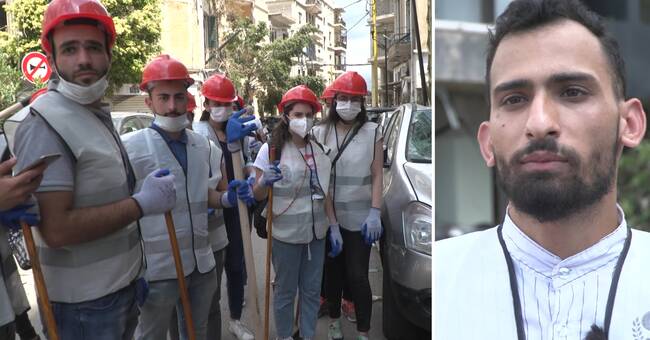Esraa is one of those who sweeps. We follow her through the broken residential neighborhoods near the port of Beirut. Many houses here lack walls and windows. A blue sneaker and a dusty doll lie in a pile of gravel and bricks.
Above what was once a balcony two floors up, an ironing board dangles and tells of an everyday life that no longer exists. But right now hundreds - if not thousands - of volunteers are going from house to house with brooms and shovels.
They carry away masses of rubble, wipe blood from the railings, carry out blown-out doors. They hand out food packages and water bottles and provide simpler medical care. They come from all over Lebanon and they make their way through the dust every day in their yellow, blue and red plastic helmets. They are hope.
"They did that"Esraa is a nursing student from the city of Saida in the south. She herself was in the mountains at 18.08 last Tuesday when something resembling an earthquake made the ground shake under her. On TV she saw the red cloud of smoke and the mushroom-like explosion. That evening she went to the nearest hospital and donated blood.
The next day she was on a bus to Beirut with about twenty of her classmates. And since then she has been part of the clearing work. When I ask if it is not the government that should lead the clearing work, she points to the harbor a few hundred meters away. The 43 meter deep crater is so large that it can be seen from space. "They did that," she says, smiling crookedly. "We're doing this."
The explosion opened gravesEven the dead are not allowed to rest in the cemetery in the harbor district. The explosion has opened graves, and parts of coffins can be seen in the rubble. A man whose mother died in the racial masses takes a deep breath. "We survived the Civil War only to die in an idiotic explosion, because someone did not do their job."
200 lives are gone. A port is gone. Lebanon was already in an acute economic crisis when the explosion occurred and it is clear that the country will not be able to cope with the construction on its own.
"The conversation stops, someone takes a step back"But there is something about the sounds here in Beirut now. And there's something about human ears, which so recently experienced one of the most powerful explosions in world history. During an interview, a roar is suddenly heard as if by an engine somewhere in the neighborhood. The conversation stops, someone takes a step back, glances flat. "Was that a bomber?"
For a fraction of a second, we are back in the uncertainty and chaos of the bang. But even if the shock lingers, it has already begun to fade. The many volunteers give hope in a city that is once again trying to rise.

